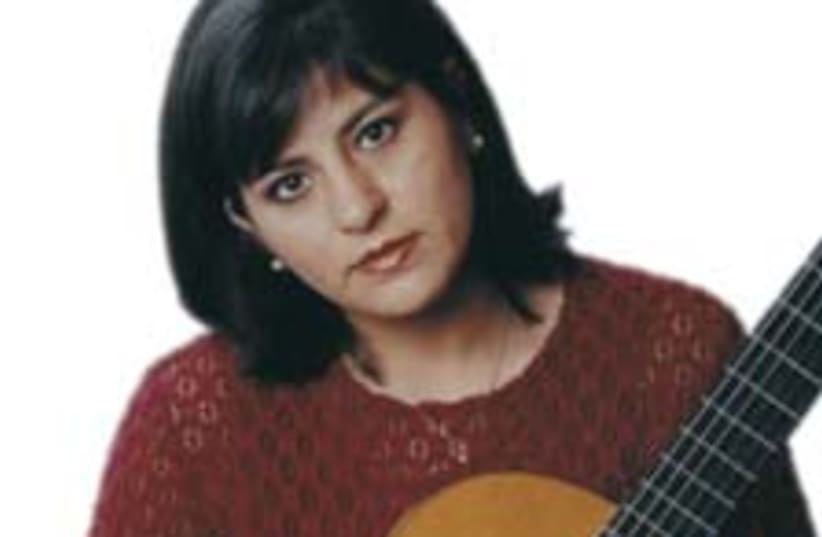Sticking her necks out
Classical guitartist Tania Ramos introduces some of Paraguay's indigenous culture to Israel.
Tania Ramos is an accomplished classical guitarist who makes regular forays from her native Paraguay to perform and record with some of the top ensembles around the world. Last month she made a first time visit to Israel as part of her reward for winning the B'nai B'rith Paraguay "Fraternidad Award". During her 10 day tour, Ramos gave concerts at the Felicja Blumental Music Center and the Cervantes Institute in Tel Aviv, and gave a master class at the Jerusalem Conservatory for Music and Dance.
It is important to note Ramos' artistic credentials because the casual observer of her latest CD Paraguay Mbarakapu might be forgiven for thinking Ramos employs gimmickry to further her career. However, there is a relatively simple - and completely professional - explanation for the cover photo which shows Ramos playing a guitar with two necks, one on either side of the instrument's body.
"I play classical works, but also Guarani music," says Ramos, "and I have each set of strings tuned differently to suit the genre. Another Paraguayan guitarist showed me his guitar with two sides, and he arranged for me to have one made, with very good wood. It has an amazing sound."
Guarani is the indigenous culture in Paraguay, and the Guarani language is in common use there. The country's popular music - besides western style rock and pop - divides between the fast European-influenced polka style and the slower Guarani genre which was initiated by composer José Asunción Flores.
Both the new release and part of the programs Ramos performed here were a tribute to her mentor, Don Efren Echeverria. "He developed a unique way of strumming and plucking the guitar at the same time," she explains. "I do that too, and I think it is very important to document this style so that other people can learn about it. Echeverria is an old man now, and can't always play. Paraguay Mbarakapu is the first recording of this technique."
Her success and critical acclaim notwithstanding, Ramos says life can be tough for artists in Paraguay. "There is no support from the government for musicians in my country. Whatever we do is due to our own efforts."
One could also imagine that predicament being further exacerbated by gender discrimination. After all, you don't see a lot of female stars in the classical world. Surprisingly, and encouragingly, Ramos has not experienced any problems in that area. "I don't think it makes any difference that I am a woman. I think the male classical musicians in Paraguay have the same challenges to deal with as I do."
Today, Ramos' main avenue of exploration focuses on Echeverria's strumming and plucking method. "I want to teach this to guitarists all over the world," she says, adding that she is looking to promote the technique as an accepted way of playing classical guitar. "I want to get in touch with classical composers and have them write works for this technique." While classical musicians are not generally known for their ability to improvise Ramos believes the Echeverria technique can help to change that. "Contemporary classical music I think is opening up to improvisation. Things are beginning to change."
if(catID != 151){
var cont = `Take Israel home with the new
Jerusalem Post Store
Shop now >>
`;
document.getElementById("linkPremium").innerHTML = cont;
var divWithLink = document.getElementById("premium-link");
if(divWithLink !== null && divWithLink !== 'undefined')
{
divWithLink.style.border = "solid 1px #cb0f3e";
divWithLink.style.textAlign = "center";
divWithLink.style.marginBottom = "40px";
divWithLink.style.marginTop = "40px";
divWithLink.style.width = "728px";
divWithLink.style.backgroundColor = "#3c4860";
divWithLink.style.color = "#ffffff";
}
}
(function (v, i){
});

